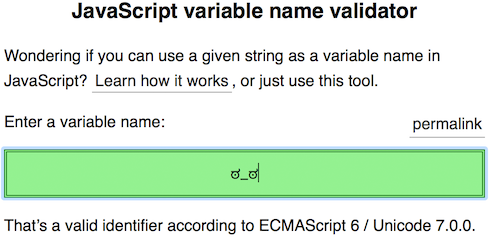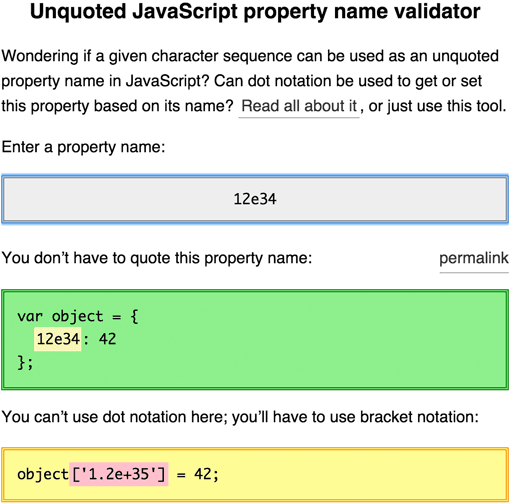ES2015 updates the grammar for identifiers. This affects a number of things, but most importantly, identifiers can be used as variable names, and identifier names are valid unquoted property names. This post describes the observable changes compared to the old ES5 behavior.
Reserved words
ES2015 reserves the await keyword in module contexts for use in the future.
// Valid in ES5, but invalid in an ES2015 module context:
var await;Escape sequences
The only type of escape sequence allowed in ES5 identifiers is the so-called Unicode escape of the form \uXXXX.
In ES2015, the new Unicode code point escape syntax is accepted as well.
// Valid in ES5 and ES2015:
var a;
// Valid in ES5 and ES2015:
var \u0061;
// Invalid in ES5, but valid in ES2015:
var \u{61};Acceptable Unicode symbols
In ES2015, identifiers must start with $, _, or any symbol with the Unicode derived core property ID_Start.
The rest of the identifier can contain $, _, U+200C zero width non-joiner, U+200D zero width joiner, or any symbol with the Unicode derived core property ID_Continue.
This differs from the definition for ES5 identifier names that was based on Unicode categories. Consequently, some Unicode symbols that were disallowed in ES5 identifiers can now be used in ES2015 identifiers just fine, and vice versa.
// Valid in ES5 & Unicode v5.1.0+, but invalid in ES2015:
var ⸯ; // U+2E2F VERTICAL TILDE
var \u2E2F; // U+2E2F VERTICAL TILDEIn ES5 identifiers, astral symbols were disallowed, even when represented as an escaped surrogate pair (\uXXXX\uXXXX).
In ES2015, astral ID_Start or ID_Continue symbols in identifiers are accepted when represented as a raw symbol or using a single \u{…} escape sequence.
// Invalid in ES5, but valid in ES2015:
var 𐊧; // U+102A7 CARIAN LETTER A2
var \u{102A7}; // U+102A7 CARIAN LETTER A2
// Invalid in ES5 and ES2015:
var \uD800\uDEA7; // U+102A7 represented as a surrogate pairThe ES5 spec allowed implementations to base their identifier support on Unicode versions as old as Unicode v3.0.0. ES2015 lists Unicode v5.1.0 as the minimum Unicode version required for compatibility.
// Valid in ES5, but only works in some ES5 engines (i.e. those with Unicode
// data from v3.2.0 or more recent):
var Ƞ; // U+0220 LATIN CAPITAL LETTER N WITH LONG RIGHT LEG
var \u0220;
// On the other hand, it is guaranteed to work in all ES2015-compliant engines.
// Valid in ES5, but only works in some ES5 engines (i.e. those with Unicode
// data from v4.0.0 or more recent):
var ȡ; // U+0221 LATIN SMALL LETTER D WITH CURL
var \u0221;
// On the other hand, it is guaranteed to work in all ES2015-compliant engines.
// Valid in ES5, but only works in some ES5 engines (i.e. those with Unicode
// data from v5.1.0 or more recent):
var _҇; // U+0487 COMBINING CYRILLIC POKRYTIE
var _\u0487;
// On the other hand, it is guaranteed to work in all ES2015-compliant engines.No more non-standard behavior
At some point all major JavaScript engines supported reserved words as identifiers if at least one of the characters was escaped. For example, var var; wouldn’t work, but e.g. var v\u0061r; would — even though this was never part of the spec.
// Invalid in ES5 and ES2015:
var var;
// Invalid in ES5 and ES2015, but supported in old ES5 engines:
var v\u0061r;ES2015 explicitly makes this behavior non-conforming, and implementations are moving away from it. Firefox/Spidermonkey, Safari/JavaScriptCore, and IE/Chakra have already dropped this behavior; Chrome/Opera/V8 plan to.
Bugs
There are open bug tickets to fully implement the ES2015 identifier grammar in Chrome/Opera/V8 (now fixed), Firefox/SpiderMonkey, Safari/JavaScriptCore (#121541 (now fixed), #208998), Microsoft Edge/Chakra (now fixed), Acorn (and therefore Babel) (#214 (now fixed), #215), Esprima, and Traceur.
Resources
I wrote some identifier tests based on ES2015 and Unicode 5.1.0, i.e. the minimum required Unicode version as per the spec. They helped me find bugs in several engines.
I created a script that generates a regular expression matching only valid identifiers as per ES5 and ES2015. At the time of writing, the ES5 version is being used in the Esprima and Acorn parsers, among other open-source projects.
There’s also an online JavaScript identifier validator, a tool that makes it easy for you to check if a given string is a valid variable name in JavaScript.

I’ve updated the unquoted JavaScript property name validator accordingly.

Comments
Jan wrote on :
Damn, for a moment I got excited there, thinking I could finally end my identifiers in question marks. Oh well.
Thanks for the writeup!
Chris Ball wrote on :
Jan: Hmm, but there are >100k valid codepoints — seems like we should be able to find one that’s either actually or just mostly visually identical to the question mark, and use that? :)
Mathias wrote on :
Jan:
ƪ,Ɂ,ʔ,ʡ,ใ, andໃall look a little bit like a question mark. And here’s a valid identifier that resembles an exclamation mark:ǃ.To get an quick overview of almost all identifier symbols, I used the following commands:
Jan wrote on :
Chris, Mathias: I have thought of that too, but I suspect this would be rather inconvenient to work with.
It would have only been an aesthetic nicety I’ve come to enjoy in Ruby. As such, it’s not worth jumping through hoops for.
Charles wrote on :
Jan: Maybe you could adopt the Common Lisp convention of putting a
pat the end of predicate function names.Jean-René Bouvier wrote on :
I was looking for an infinity symbol and the closest I found is U+1011, i.e. Myanmar Tha letter:
ထ.So you can write:
Jean-René Bouvier wrote on :
Mathias: If you combine the Latin letter glottal stop (
ʔU+0294) with the combining dot below (̣U+0323), you get a near perfect question mark,ʔ̣, as well as a valid JavaScript identifier.treegb wrote on :
Very helpful validator. Thanks
Jean-René Bouvier wrote on :
I tried
ᝌ(U+174C BUHID LETTER YA) in the validator, but there’s no support for this character set. Now that Google has created NoTo fonts it might be worth using them to display all/most Unicode characters.Ricky Reusser wrote on :
I just got a sick feeling in the pit of my stomach at the thought of debugging: